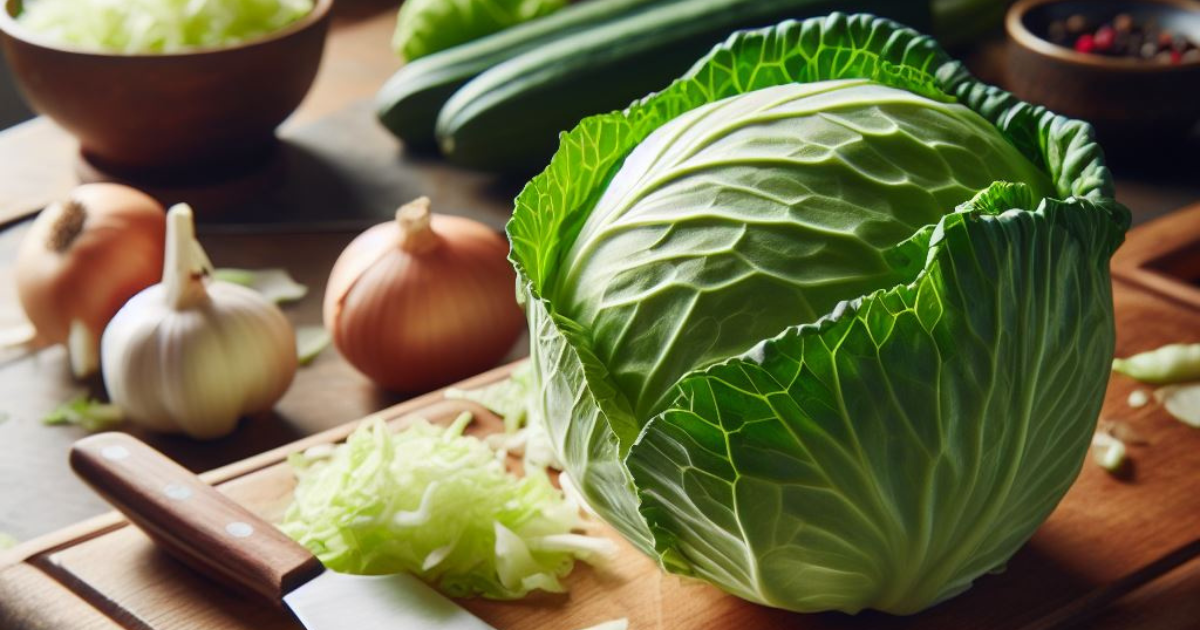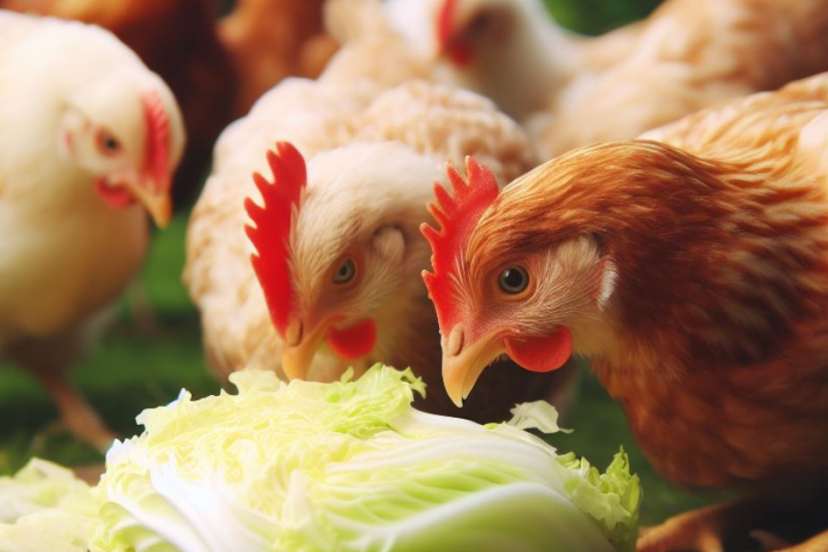Can Chickens Eat Cabbage? Learn whats safe
Introduction
Yes chickens can eat cabbages and in this article, I’ll take you through my quest to understand how chickens can safely indulge in cabbage. I’ll share insights and helpful tips gathered over years of chicken keeping. If you’ve ever been curious about adding cabbage to your flock’s diet, read on learn the answers you need.
Cabbage, known for its nutritional richness, could offer a new dimension to your chickens’ diet. But are there any potential concerns and risks to be aware of? How should you prepare cabbage to make it safe and enjoyable for your feathered friends? I’ll address all these questions and more as we delve into the world of cabbage and chickens.
So, whether you’re a seasoned chicken keeper or a newcomer to the backyard poultry scene, join me on this cabbage journey to unlock the leafy goodness and find out if your chickens can enjoy this nutritious treat. Together, we’ll explore the benefits, tackle potential concerns, and share tips on introducing cabbage to your flock.
The Nutritional Value of Cabbage
Before you introduce any new food into your chickens’ diet, it’s essential to understand its nutritional content and the potential benefits it can offer. Cabbage is no exception, and it turns out this cruciferous vegetable has quite a bit to bring to the table.
The study investigated the effects of cabbage supplementation in broiler and pullet chickens. It found that cabbage, particularly when fed at a 3% dietary level, can improve body weight in broilers and reduce cholesterol levels, which may help lower the risk of heart disease.
Vitamins Galore
Cabbage is a powerhouse of essential vitamins, which can be highly beneficial for your feathered companions. Vitamin K, for instance, plays a significant role in blood clotting, contributing to their overall health. Chickens can benefit from this vitamin, especially during molting, as it helps in the formation of new feathers.
Vitamin C, another notable component in cabbage, is a well-known immune booster. Just like us, chickens can face various health challenges, and a robust immune system is their first line of defense. Cabbage can help enhance their immunity, keeping them resilient in the face of potential threats.
Folate for Development
Folate, or vitamin B9, is another essential nutrient found in cabbage. It’s a key player in cell division and growth. For young chicks or chickens that are still developing, folate can contribute to their healthy growth. It’s crucial for maintaining their overall well-being and vitality.
Hydration from Water Content
Cabbage is primarily composed of water, which can serve as a natural source of hydration for your chickens. As any chicken keeper knows, providing adequate water, especially in hot weather, is essential. Cabbage can complement their water intake, keeping them well-hydrated during scorching summer days.
Dietary Fiber for Digestion
Dietary fiber is an often-overlooked component of chicken nutrition. Cabbage contains dietary fiber that can aid in digestion. A well-functioning digestive system is essential for optimal nutrient absorption, which directly affects their overall health.
Enrichment and Variety
Beyond the nutritional value, introducing cabbage to your chickens’ diet can offer another dimension to their lives. Chickens thrive on variety, and exploring new treats can keep them engaged and content. The vibrant green leaves and crispy texture of cabbage add excitement to their daily meals.
In the next section, we’ll discuss the potential benefits of feeding cabbage to your chickens, as well as some considerations to keep in mind.
Benefits of Feeding Cabbage to Chickens

1. Nutritional Boost
Cabbage is like nature’s multivitamin for chickens. It’s packed with essential vitamins, particularly vitamin K and vitamin C. These nutrients can contribute to their overall well-being. Vitamin K, responsible for blood clotting and bone health, ensures your chickens stay in prime condition. Vitamin C, well-known for its immune-boosting properties, can help your flock ward off diseases more effectively.
2. Enhanced Hydration
Chickens can be sensitive to heat stress, especially during the sweltering months. Cabbage, with its high water content, can be a life-saver. It’s like providing your chickens with a juicy, refreshing treat that keeps them hydrated and comfortable when the temperature soars.
3. Dietary Enrichment
Chicken owners know the value of keeping their flock entertained and engaged. Feeding cabbage offers a delightful change from their regular feed. The act of pecking at cabbage leaves and exploring its texture adds a layer of enrichment to their daily routine. I’ve seen my chickens thoroughly enjoy this new addition to their diet.
4. Shinier Feathers
Healthy feathers are not just about aesthetics; they serve a critical function in regulating body temperature and protecting against the elements. Cabbage, with its rich nutrient content, can lead to shinier, healthier plumage in your flock. You’ll be amazed at how a simple dietary addition can result in vibrant, glossy feathers.
5. Happier Chickens
Chickens are social creatures, and their happiness is contagious. When they’re content and well-fed, it reflects in their interactions and demeanor. Feeding cabbage has led to more cheerful clucks and pecks in my coop, creating a more harmonious environment for my chickens.
In the next section, we’ll explore some potential concerns and risks associated with feeding cabbage to chickens, so you can make informed choices and ensure your flock’s well-being.
Potential Concerns and Risks
While cabbage can be a nutritious addition to your chickens’ diet, there are a few potential concerns and risks you should be aware of to ensure their well-being:
1. Overindulgence
Cabbage, like any treat, should be offered in moderation. Chickens can’t thrive on cabbage alone. Feeding them excessive amounts can lead to digestive issues, including diarrhea. It’s crucial to remember that cabbage should be a supplementary treat, not the primary food source.
2. Choking Hazard
The stem and core of cabbage can pose a choking hazard for chickens. To prevent this risk, always remove the core and cut the cabbage into smaller, manageable pieces. This ensures your chickens can peck at it without struggling with large, unwieldy chunks.
3. Potential for Odorous Eggs
Cabbage contains sulfur compounds, which, when consumed by chickens, can lead to eggs with a sulfur-like smell. While this odor doesn’t make the eggs harmful for consumption, it can be off-putting. If you’re sensitive to the smell or concerned about egg quality, consider limiting the amount of cabbage in their diet.
4. Gastrointestinal Upset
Some chickens may have more sensitive digestive systems than others. Feeding them a new treat like cabbage can sometimes lead to gastrointestinal upset, especially if they’re not used to it. Introduce cabbage gradually and monitor your chickens for any signs of discomfort or digestive issues.
5. Allergies
While rare, some chickens may have mild allergic reactions to cabbage. If you notice any adverse reactions like rashes or unusual behavior, it’s best to discontinue feeding them cabbage and consult with a poultry expert.
Understanding these potential concerns and risks empowers you to make informed decisions when offering cabbage to your chickens. By approaching this treat with care and moderation, you can mitigate these risks and provide a safe and enjoyable experience for your flock.
In the next section, we’ll discuss how to properly prepare cabbage for your chickens to ensure their safety and enjoyment.
Preparing Cabbage for Chickens

To make cabbage a delightful and safe treat for your chickens, it’s crucial to prepare it properly. Here are the steps I follow:
Selecting Fresh Cabbage
Begin by choosing fresh cabbage heads. Look for cabbage that is firm, without wilting leaves or blemishes. Fresh cabbage ensures that your chickens get the best quality nutrition.
Thorough Washing
Before serving, it’s essential to wash the cabbage thoroughly. Rinse it under cool, running water to remove any dirt or pesticides. This straightforward step guarantees that your flock gets clean and safe treats.
Removing the Core
To eliminate the choking hazard posed by the core and stem of cabbage, cut around the stem and remove the core. This makes it safer for your chickens to enjoy their snack without the risk of obstruction.
Chop into Manageable Pieces
To make cabbage more accessible for chickens, chop or shred it into bite-sized pieces. This allows your flock to peck at the cabbage without struggling with large, unwieldy chunks.
Introducing Cabbage Gradually
When you first offer cabbage to your chickens, you may notice a mix of curiosity and skepticism. Chickens can be cautious about new foods. Start by placing a few small pieces in their feeding area and observe their response. Over time, they’ll likely grow more comfortable with this treat.
Dried cabbage
A study evaluated the effects of incorporating dried cabbage leaf residues into broiler diets, replacing some corn and soybean meal. The research found that including up to 9% cabbage leaf residues had no adverse impact on broiler performance and improved nutrient digestibility in the birds’ digestive systems, especially in older birds.
Moderation is Key
Remember, moderation is crucial. Cabbage should be a supplementary treat, not the primary food source. A few times a week, or even less, is usually sufficient. Their regular poultry feed should remain their primary source of nutrition.
By preparing cabbage with these steps in mind, you can make this treat not only safe but also enjoyable for your chickens. It ensures they can indulge in the fresh, green goodness of cabbage without any worry.
In the next section, I’ll share some user reviews and ratings, highlighting the experiences of fellow chicken enthusiasts who have introduced cabbage into their flock’s diet.
Closing remarks
In conclusion, cabbage can be a wonderful and nutritious treat for your chickens, and my personal experience and the insights from other chicken keepers support the idea that this vibrant vegetable can add vibrancy to your flock’s life. So, go ahead and offer your feathered friends some cabbage and watch them peck away with delight! So what else can chickens eat? Can chickens eat broccoli? Find out more!
FAQs
1. Can chickens eat the core of cabbage?
No, it’s best to remove the core before offering cabbage to your chickens. The core can be tough and present a choking hazard. It’s safer to provide the leafy parts.
2. How often should I feed cabbage to my chickens?
Cabbage should be offered as an occasional treat, not as a primary food source. I usually give them cabbage a few times a week to maintain variety in their diet.
3. Can cabbage replace their regular feed?
No, cabbage should not replace their regular poultry feed. While it offers valuable nutrition, it is not a complete source of nutrients. Cabbage should complement their diet.
4. Will cabbage affect the taste of the eggs?
No, feeding cabbage to chickens does not affect the taste of their eggs. Eggs maintain their natural flavor, so you can enjoy the same delicious eggs from your flock.
5. Can you feed chickens all types of cabbage, including red and green?
Yes, chickens can enjoy all types of cabbage, including red and green varieties. You can vary their diet with different cabbage types to keep it interesting.
These FAQs should provide you with a better understanding of the practical aspects of introducing cabbage into your chicken’s diet. Remember to keep their diet balanced, focus on safety, and enjoy the colorful addition to their meals.
*We may earn a commission from purchases made through our links, at no cost to you. This does not affect our product recommendations. Please see our disclosure to learn more.




